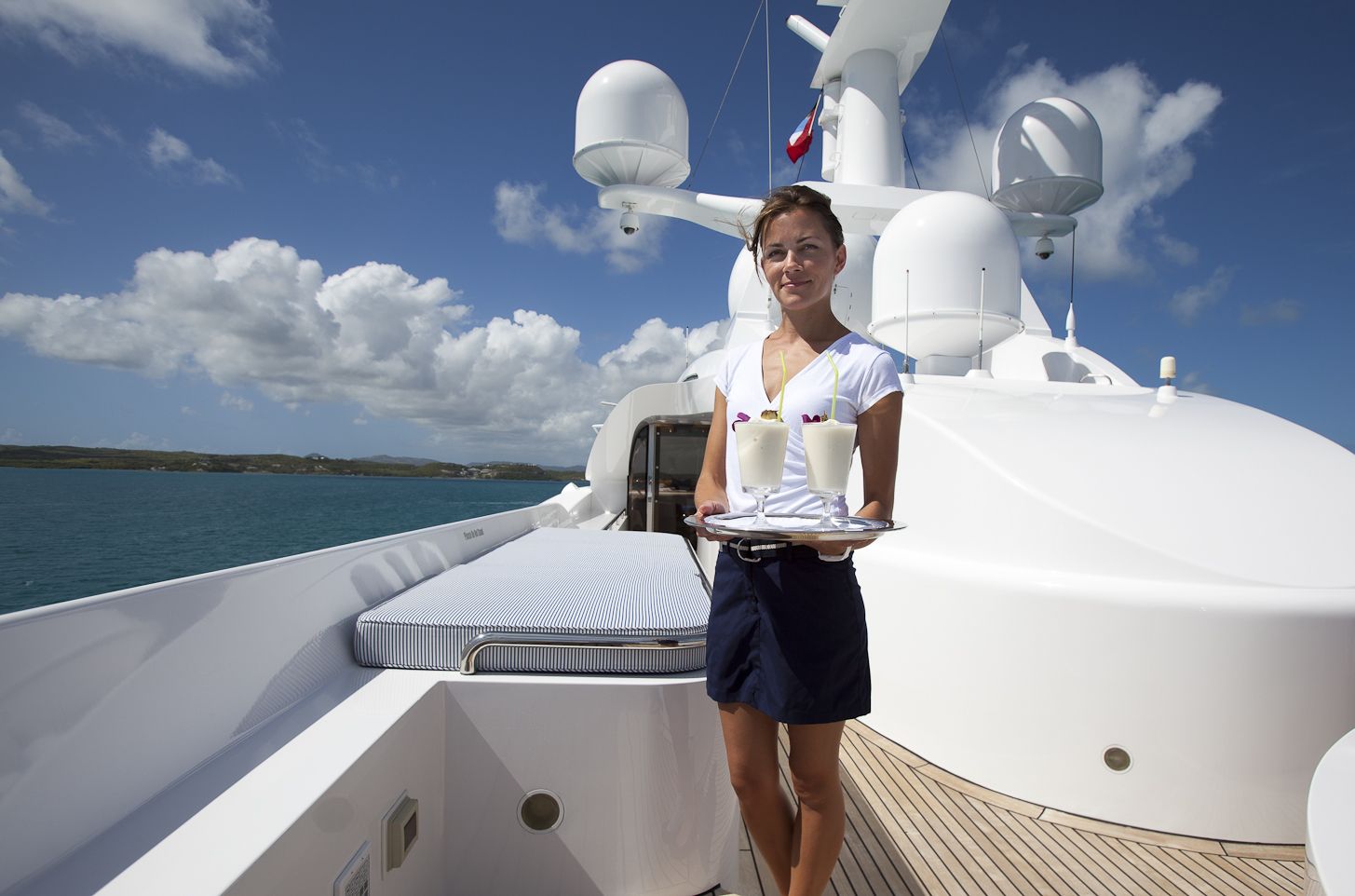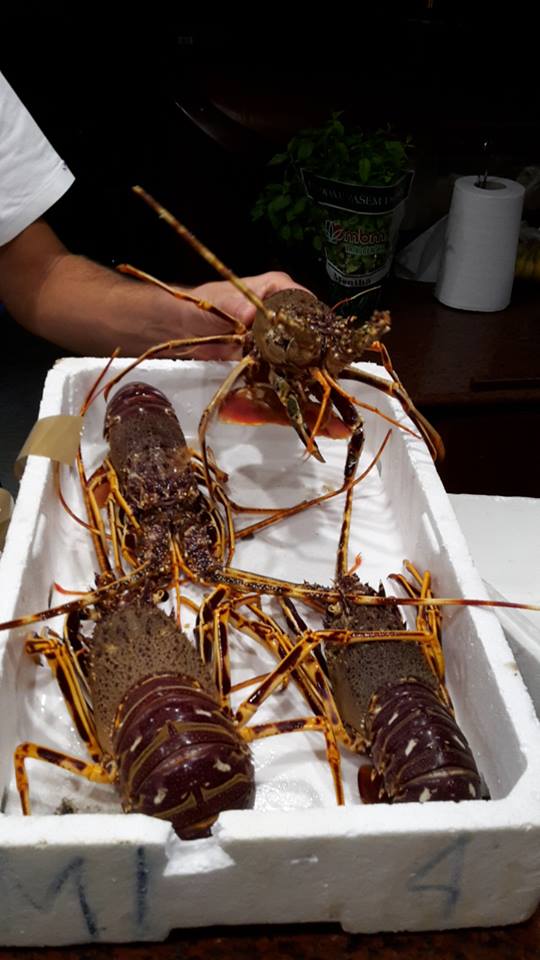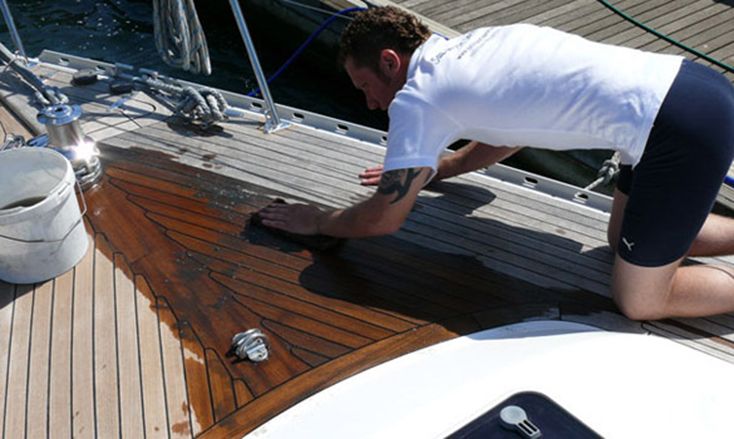No one really likes to talk about money, but sometimes we need to. In this case I am going to spell it out and talk about tipping on a yacht.
Money. There is nothing that makes me more uncomfortable to talk about than money. I am not sure why, but I always squirm whenever this topic comes up. I have no problem telling others to respect their value and worth, but for some reason I always had an issue doing the same for myself (do as I say, not as I do).
I have talked to a lot of people in the tourism and hospitality sector and we all seem to have similar profiles. We near kill ourselves trying to make others happy, to go above and beyond to create an unforgettable experience, yet our salaries often don’t reflect the physical or mental strain, let alone the hours we work. So, yes, in the tourism and hospitality sector we do expect to get tipped. Which still makes me uncomfortable to say those words out loud, because – if you are passionate about what you do, you should do all of these things anyway right?
History of Tipping
Well, first let’s touch on a little history of tipping – tipping is thought to have begun in English around the 17th Century, but there is no documentation of gratuity in the sense until the 18th Century. Regardless, it became a practice to ‘tip’ servers in order to ensure the best, prompt service. This practice moved to the states and in 1897 the New York Times reported a movement against tipping reasoning that it created a ‘servile class’.

Pinterest, old English tavern
However, it is of course still here and considered the norm around the world. How much to tip differs from country to country, but besides America, most European countries, 10% is considered standard. If you want more specifics on tipping in Croatia, you can check out this great article here.
But, this is about tipping on Charter Yachts, I just wanted to lead into it a little.
Like I said, the conversation of money and tipping has always made me feel uncomfortable. After working as a hostess for three years in Croatia on a luxury yacht, I know a little about tipping on yachts and the ‘luxury world’ in general.
A day in the life of a Hostess, Chef, Captain, Deckhand...
I worked as a hostess on a yacht, because I truly love people, hospitality and tourism. The thought that I was in a position to genuinely make someone’s day or create a beautiful experience that weaves its way into someone’s memories, is really something special. I didn’t do it for the money, I did it because I loved it. I went above and beyond because I cared, not because I expected to be tipped. But, let’s not fool ourselves – if you go into a restaurant or are on a yacht, we all know the difference between just good and excellent service, it makes a difference to the experience and requires real skill.
But this is almost beside the point. The amount of work required on a yacht is beyond extraordinary.
My typical day on a yacht began at 6am and finished around midnight to 1am – granted I would try take a 45-minute power-nap in that time. So, let’s say most working days are 16 – 18 hours long. In that time, I wore many hats – I was a waitress, bartender/cocktail master, hostess, tour guide, concierge (booking restaurants, wine tours, activities), entertainer (questions, oh the questions) and sometimes a therapist.

Credit: AYC Super Yacht Recruitment
But, this isn’t all about me. The Chef’s day also began at 6am and he would be in the kitchen until around 4pm IF the guests only took half-board (breakfast and lunch onboard), but if they took full-board (all meals), it could mean days in the kitchen from 6am until around 10pm. And while cooking for 10 - 14 people sounds easy, I can't even begin to explain how much more complicated this can be - allergies, likes/dislikes/demands/last-minute demands... the chef is not just a chef, he is the personal chef to 10+ guests and this is no easy feat.

Photo Credit: Tash Pericic
The role of the Chef and Hostess are definitely the most demanding in terms of guest-interaction and physical work. However, the Captain is obviously a very important man and while it may just look like he ‘drives’ a boat, he has enormous responsibilities. Ensuring the mechanics of the boat and that everything is running smoothly is a full-time job. What you don't see behind the scenes, is the captain checking tanks, pumps, engines, changing the oil... A yacht is basically a luxury hotel on the water, with so many moving parts (literally), anything and everything can go wrong. Mentally, the captain is always switched on, thinking about the yacht, weather and safety of the guests. Then of course, there is sailing at night if guests want to go further distances, or changing positions multiple times in a day - which can require an array of manoeuvres and just the general frustration of dealing with demands of people who know very little about boats.

Depending on the hierarchy and size of the boat, there are also sailors/deckhands and their job can be just as demanding.
Crew work 12+ hours a day, 7 days a week for around 4 months straight…
In short, there is a full team, on-call 24 hours, 7 days a week for the guests’ needs. Oh, did I mention in Croatia most charters run from Saturday to Saturday? Which means that guests get off the yacht at 9am in the morning and a new group arrives at 5pm; giving 8-hours to completely turn the boat around, stock, clean and have it looking perfect for the next group. So, many boats and crew work 12+ hour days for 16 to 22 weeks, straight. Just let that sink in for a second.

Credit: The Yacht Service Company
Now that you have a little insight, you can imagine how we felt at the end of the week if we barely got tipped.
Tipping etiquette – aka, what to tip on a charter yacht
Let me spell it out, because it is taboo for some reason, but now that I don’t work on a luxury yacht I can say this. On any yacht, whether it costs €20,000 for the week, or €100,000, 5 – 15% of the total cost is standard. If the service is good, but not great, 5% would be appropriate (note, not 0%), if the service was truly outstanding then it should be upwards of 10%. This policy has been backed up by the Mediterranean Yachting Brokers Association (MYBA).
Breakdown the tip and it makes sense
If the yacht is €20,000 that means a €2,000 tip. But just think about the maths for a second. If there are four crew, that is €500 each. In restaurants, I was making minimum €500 a week and I didn’t live, breathe and work in the restaurant – I still got to go home at the end of every night, my shifts were 10 – 12 hours and I had at least one day off a week. Breaking it down further, €500 is just over €70 per day, per staff member and if you have between 10 – 12 people on your yacht, it is less than €10 per person.
Now, if you go out for dinner at a restaurant, with three friends and spend €1,000, chances are you would tip at least €100 (which is about €25 tip per person at the table) and you would probably be in and out in 2 – 3 hours.
On a yacht, you have your every wish met (and I have had some outrageous demands), but we do it, because that is the industry we are in, but those of us who truly love it, do it really well – and I have no doubt guests know the difference.
Yet, sometimes at the end of the week (not often, but it did happen), we opened the envelope and received less than €100 each, for 24/7 care, 7-days cruising… we were flooded with compliments – best service, best holiday ever, best crew, best boat… and the value that was placed on that was €20 - €100 for a week’s work. You tell me is that fair?
If I can be ruthless and honest, typically Europeans are the worst tippers, it doesn’t matter what job people had, or how many millions… a lot of Europeans were the worst tippers I have come across in a decade of hospitality experience. Tipping less than I would make from one table, in a restaurant.
And to be honest, it is actually a little soul-destroying. I won’t share my salary, but if I calculate the number of hours I worked against my salary, my hourly rate was about €2.50. So, you have to forgive us for being a little pissed (not that we would ever show it) when someone then goes and values our 16-hour days at around €15 per day, but don’t flinch at spending €5,000 on dinner or €1,000 on a bottle of wine… to me this is the lowest of the low (proper d*** move) and unfortunately sums up the luxury industry sometimes.
Don’t be a d***
Moral of the story, think about it. Forking over a large sum of money at the end of the week may seem unreasonable, but break it down a little. And, the fact is if you have money to book a luxury charter yacht and you want all the bells and whistles that it comes with – no ifs, buts, or maybes – don’t be a d***, tip your crew!


